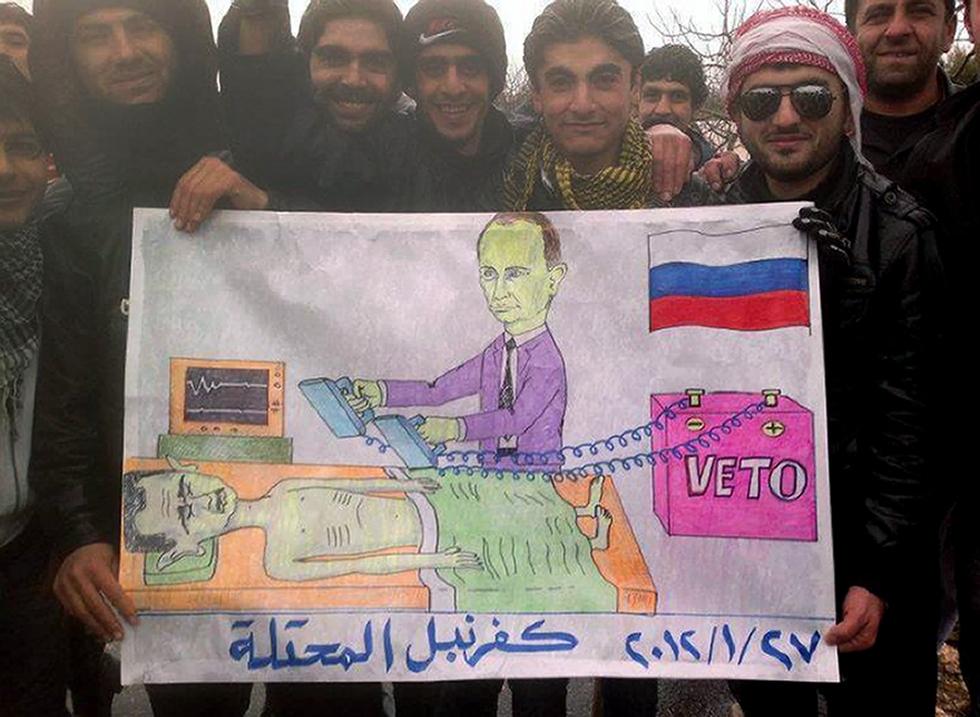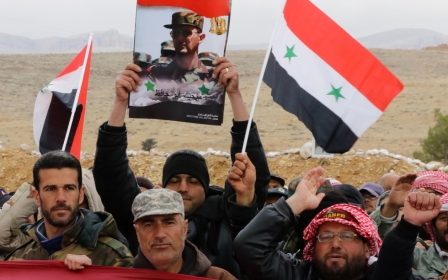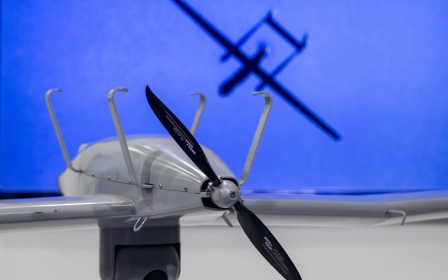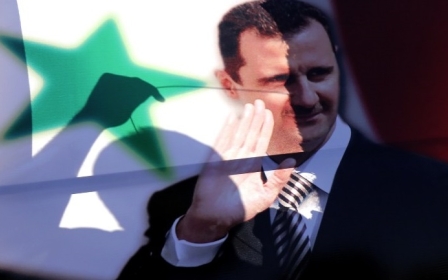As Syrians mark 5th uprising anniversary, Russia continues to call the shots

Vladimir Putin’s announcement that Russia will be withdrawing its troops from Syria has come as a surprise to many but it is the latest episode of Moscow’s assertion of its prominence over the regime of Bashar al-Assad.
The announcement coincides with the latest round of Syria talks in Geneva and the fifth anniversary of the Syrian uprising. It also comes two years after the Geneva II conference that tried but failed to put an end to the conflict, and signals a key change. The Syrian regime is no longer a mere Russian ally but has become a Russian client that is expected to act according to Moscow’s will or face grave consequences.
The withdrawal announcement is not the first time that Moscow has publicly sought to pressure Assad. Last month, there was a stand-off between Syrian President Bashar al-Assad and Russia’s United Nations envoy Vitaly Churkin, which was interpreted by many as an indication of a crack in the Russian-Syrian alliance. In a television interview, Assad had declared his intention to recapture the whole of Syria. This announcement triggered a public rebuke by Moscow in the form of comments by Churkin.
In an interview with a Russian newspaper, Churkin said that Assad’s statement “obviously contradicts Russia's diplomatic efforts” and that “if the Syrian government… follows Russia's leadership in regulating this crisis, then it will have the opportunity to exit the crisis with dignity. If, on the other hand, they stray from this path… there will be a difficult situation, one that will also involve them.” But Churkin’s reply is not an affirmation of a schism between Moscow and Damascus; rather, it is an assertion of Russia’s superiority over the Syrian regime. In other words, it is putting Assad in his place.
This episode had a precedent. In October 2015, shortly after Russia’s airstrikes campaign in Syria started, Assad was summoned to Moscow. The Russian-Syrian power dynamic became clearer in January 2016, when a Russian government website released details of the contract drawn between Moscow and the Syrian government in August 2015 regarding Russia’s air campaign in Syria.
The contract states that “personnel of the Russian aviation group shall be able to freely cross the border… and shall not be subject to customs or border control”; that “representatives of the Syrian Arab Republic shall not have the right to enter the place of deployment without prior agreement with the commander,” and that “the Syrian Arab Republic assumes responsibility for settling all claims that could be put forward by third parties as a result of damage caused by the activities of the Russian air group and its personnel.”
From ally to client
In other words, the formal relationship between Moscow and Damascus is now one in which complete compliance is expected from Bashar al-Assad, and Russia is making sure to periodically remind him of this publicly.
Moscow has been asserting that without its intervention in Syria over the past few months, the Assad regime would have collapsed. This intervention took on a more hands-on shape as time went by, with Russia directing military operations from a command centre in Latakia and even, as seen in a video circulated online, giving medals to Syrian army officers as a reward for their performance in battles. In the video, the Syrian and Russian flags are seen being flown side by side, leading some observers to label Russia’s presence an “occupation.”
Without Russia’s help, Assad will certainly find himself vulnerable. But Putin’s withdrawal announcement must also be taken in context. Russia is not abandoning Syria. It is keeping its Latakia command centre active and leaving its air defence system intact. It is simply downgrading its involvement as a way to assert its power over Assad.
Russia will continue to play the long game in Syria. It is finding in the Syrian conflict a useful tool to stand up to the West and get recognition, from the United States in particular, that it is a global superpower once more. The bilateral ceasefire agreements between Russia and the US, first brokered during the Munich security conference and later through a conversation between John Kerry and Sergey Lavrov, are only confirming to Russia the value of its stance on Syria.
But what is noticeable in the period leading up to the current Geneva talks is that while the Syrian opposition has been taking a firmer stand in the face of external pressure from the US and Russia, the same cannot be said about Bashar al-Assad. While the opposition has wide-ranging support from regional partners, Assad is now primarily reliant on Russia.
Even Iran, for years Assad’s main external supporter in the conflict, has now taken a back seat as a result of Russia’s intervention. Some argue that Assad’s defiant rhetoric is the result of being supported by Iran as a way to stand up to Russia’s pressure. But after Churkin’s rebuke, Assad was quick to send his spokesperson Buthaina Shaaban to Moscow, after which the Kremlin announced Assad’s commitment to abide by the ceasefire agreed by Russia.
Two years ago during Geneva II, Russia was an influential player but far from able to pressure Assad to accept anything he did not agree with. This power dynamic has now changed. This means that in the current Geneva talks, it is Russia which calls the shots on behalf of the Syrian regime. Assad, meanwhile, after five years of trying to crush the opposition to maintain his position, has ironically cornered himself into a supporting role in the conflict.
- Lina Khatib is Senior Research Associate with the Arab Reform Initiative. Follow her on Twitter @LinaKhatibUK
The views expressed in this article belong to the author and do not necessarily reflect the editorial policy of Middle East Eye.
Photo: Anti-government Syrians in the northwestern town of Kfar Nubul in Idlib province on 27 January, 2012 carrying a cartoon depicting the Russian leader Vladimir Putin defibrillating Syrian President Bashar al-Assad by using a veto vote to block a UN Security Council resolution against Damascus (AFP/HO/ Local Coordination Committees of Syria).
New MEE newsletter: Jerusalem Dispatch
Sign up to get the latest insights and analysis on Israel-Palestine, alongside Turkey Unpacked and other MEE newsletters
Middle East Eye delivers independent and unrivalled coverage and analysis of the Middle East, North Africa and beyond. To learn more about republishing this content and the associated fees, please fill out this form. More about MEE can be found here.





